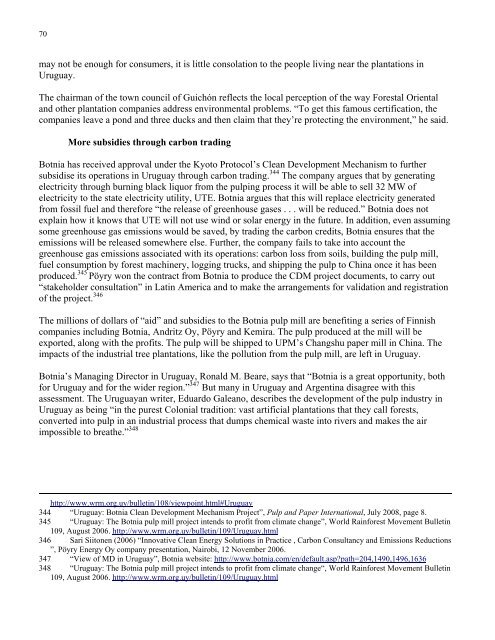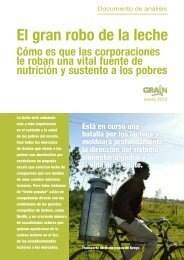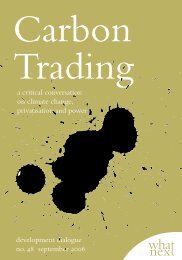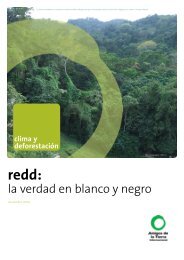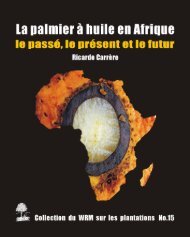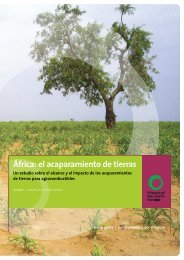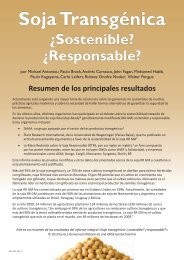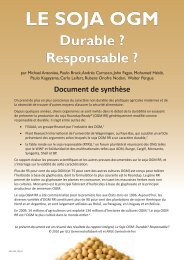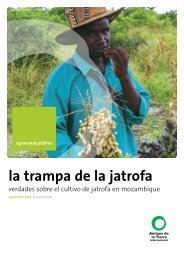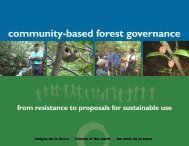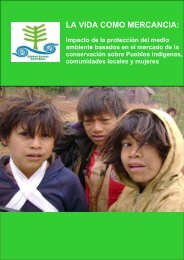Plantations, poverty and power - Critical Information Collective
Plantations, poverty and power - Critical Information Collective
Plantations, poverty and power - Critical Information Collective
You also want an ePaper? Increase the reach of your titles
YUMPU automatically turns print PDFs into web optimized ePapers that Google loves.
70<br />
may not be enough for consumers, it is little consolation to the people living near the plantations in<br />
Uruguay.<br />
The chairman of the town council of Guichón reflects the local perception of the way Forestal Oriental<br />
<strong>and</strong> other plantation companies address environmental problems. “To get this famous certification, the<br />
companies leave a pond <strong>and</strong> three ducks <strong>and</strong> then claim that they’re protecting the environment,” he said.<br />
More subsidies through carbon trading<br />
Botnia has received approval under the Kyoto Protocol’s Clean Development Mechanism to further<br />
subsidise its operations in Uruguay through carbon trading. 344 The company argues that by generating<br />
electricity through burning black liquor from the pulping process it will be able to sell 32 MW of<br />
electricity to the state electricity utility, UTE. Botnia argues that this will replace electricity generated<br />
from fossil fuel <strong>and</strong> therefore “the release of greenhouse gases . . . will be reduced.” Botnia does not<br />
explain how it knows that UTE will not use wind or solar energy in the future. In addition, even assuming<br />
some greenhouse gas emissions would be saved, by trading the carbon credits, Botnia ensures that the<br />
emissions will be released somewhere else. Further, the company fails to take into account the<br />
greenhouse gas emissions associated with its operations: carbon loss from soils, building the pulp mill,<br />
fuel consumption by forest machinery, logging trucks, <strong>and</strong> shipping the pulp to China once it has been<br />
produced. 345 Pöyry won the contract from Botnia to produce the CDM project documents, to carry out<br />
“stakeholder consultation” in Latin America <strong>and</strong> to make the arrangements for validation <strong>and</strong> registration<br />
of the project. 346<br />
The millions of dollars of “aid” <strong>and</strong> subsidies to the Botnia pulp mill are benefiting a series of Finnish<br />
companies including Botnia, Andritz Oy, Pöyry <strong>and</strong> Kemira. The pulp produced at the mill will be<br />
exported, along with the profits. The pulp will be shipped to UPM’s Changshu paper mill in China. The<br />
impacts of the industrial tree plantations, like the pollution from the pulp mill, are left in Uruguay.<br />
Botnia’s Managing Director in Uruguay, Ronald M. Beare, says that “Botnia is a great opportunity, both<br />
for Uruguay <strong>and</strong> for the wider region.” 347 But many in Uruguay <strong>and</strong> Argentina disagree with this<br />
assessment. The Uruguayan writer, Eduardo Galeano, describes the development of the pulp industry in<br />
Uruguay as being “in the purest Colonial tradition: vast artificial plantations that they call forests,<br />
converted into pulp in an industrial process that dumps chemical waste into rivers <strong>and</strong> makes the air<br />
impossible to breathe.” 348<br />
http://www.wrm.org.uy/bulletin/108/viewpoint.html#Uruguay<br />
344 “Uruguay: Botnia Clean Development Mechanism Project”, Pulp <strong>and</strong> Paper International, July 2008, page 8.<br />
345 “Uruguay: The Botnia pulp mill project intends to profit from climate change”, World Rainforest Movement Bulletin<br />
109, August 2006. http://www.wrm.org.uy/bulletin/109/Uruguay.html<br />
346 Sari Siitonen (2006) “Innovative Clean Energy Solutions in Practice , Carbon Consultancy <strong>and</strong> Emissions Reductions<br />
”, Pöyry Energy Oy company presentation, Nairobi, 12 November 2006.<br />
347 “View of MD in Uruguay”, Botnia website: http://www.botnia.com/en/default.asppath=204,1490,1496,1636<br />
348 “Uruguay: The Botnia pulp mill project intends to profit from climate change“, World Rainforest Movement Bulletin<br />
109, August 2006. http://www.wrm.org.uy/bulletin/109/Uruguay.html


